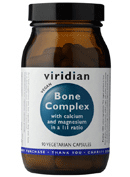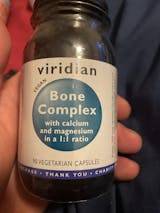
Viridian Bone Complex 90 Capsules
What is Viridian Bone Complex - 90?
Vitamin C contributes to normal collagen formation for the normal function of bones, cartilage, skin and teeth. Calcium and magnesium are needed for the normal maintenance of bones and teeth.
Vitamin D contributes to normal blood calcium levels and to the normal absorption / utilisation of calcium. Vitamin D also helps maintain normal bones, teeth and muscle function.Vitamin K contributes to the maintenance of normal bones.
The vitamin C in this formula is buffered to be gentle on the stomach. The calcium and magnesium are cheltated as citrates. Additional boron and malic acid.
Vitamin D in this formula is vegan.
What does Viridian Bone Complex - 90 do?
Viridian’s Bone Complex is an advanced formulation providing highly bio-available forms of calcium and magnesium, along with the synergistic support of vitamin K2 and D2 to maximise activation of proteins, central to bone mineralisation and to help aid in the maintenance of a healthy skeletal system. The formula provides calcium and magnesium on a 1:1 ratio.
How does Calcium help with Osteoporosis?
Osteoporosis is characterised by reduced bone mass resulting in increased skeletal fragility and susceptibility to fractures. Many nutrients are important to bone health but calcium is the one most likely to be deficient. In addition to calcium’s role within the structure of bone, its concentration in the blood activates controlling mechanisms on the release of parathyroid hormone (PTH) and calcitonin release. These hormones directly influence the dynamic movement of calcium in and out of bone tissue.
How does Magnesium (citrate) help with Osteoporosis?
Magnesium supplementation is as important as calcium supplementation in the treatment and prevention of osteoporosis. Women with osteoporosis have lower bone magnesium content and other indicators of magnesium deficiency than women without osteoporosis. Vitamin D levels have also been found to be low in magnesium deficient osteoporosis sufferers – this may be because magnesium is required for an enzyme that converts vitamin D its most active form (1,25-(OH)2D3).
Vitamin C - Vitamin C (ascorbic acid) is an important nutrient within this formula due to the known benefits of vitamin C on collagen production (e.g. bone matrix). Ascorbic acid can also act as a solubilising agent and provide a highly bio-available form as calcium ascorbate. Additional benefits include antioxidant activity, immune function, and cardiovascular maintenance.
Malic Acid
It would appear that calcium presented as a citrate/malate salt offers high solubility with superior absorption. Malic acid is a very effective chelation creating a reaction in the stomach to enhance absorption of minerals. The acid reacts with the mineral to break the bonds with its original inorganic chelation agent. This frees the mineral to bond with the malic acid to create a malate or allows the free mineral to chelate to other organic bonds available in the stomach, i.e. citric acid (citrate), proteins (amino acid chelate) and so on. These more effective chelation agents allow for better absorption. It has been shown that calcium carbonate can have a 4-5% absorption rate, adding malic acid can increase the absorption to around 30-40%.
How does Vitamin K help joint & bone support ?
a deficiency of vitamin K leads to impaired bone mineralisation because of inadequate osteocalcin levels. Osteocalcin and Matrix Gla protein (MGP) are the two best known and characterized calcium binding proteins. Osteocalcin is synthesized by the bone forming cells - the osteoblasts. It plays an important role in the binding of calcium to hydroxyapatite – the inorganic bone material which composes about 70% of the total bone mass. The severity of fractures has been shown to correlate with circulating vitamin K levels. Vitamin K’s presence in green leafy vegetables may be one of the protective factors of a vegetarian diet against osteoporosis.
How does Boron help with Osteoporosis?
Boron appears to assist in healthy bone formation through its effects on calcium and vitamin D metabolism, helping with joint & Bone support.. Post menopausal women fed a low-boron diet have shown decreased concentrations of 25-hydroxycholecalciferol. Changes caused by boron deprivation have demonstrated depressed plasma ionised calcium and calcitonin as well as elevated plasma total calcium and urinary excretion of calcium. In one human study, magnesium deprivation depressed plasma ionised calcium and cholesterol. Because boron and/or magnesium deprivation causes changes similar to those seen in women with postmenopausal osteoporosis, these elements are apparently needed for optimal calcium metabolism and are thus needed to prevent the excessive bone loss which often occurs in postmenopausal women and older men.
How does Vitamin D2 help with Bone health?
There are two major food forms of vitamin D – vitamin D2 (ergocalciferol - plant derived) and vitamin D3 (cholecalciferol – animal derived). Vitamin D2 is the plant-sourced form most often added to milk and other foods and nutritional supplements. The major biological function of vitamin D is to maintain normal blood levels of calcium and phosphorus. Vitamin D aids in the absorption of calcium, helping to form and maintain strong bones. Recently, research also suggests vitamin D may provide protection from osteoporosis. Vitamin D levels have also been found to be low in magnesium deficient osteoporosis sufferers – this may be because magnesium is required for an enzyme that converts vitamin D into its most active form .
Viridian bone complex - 90 As a food supplement, take four capsules daily with food as a daily dose, or as directed by your healthcare practitioner.
Four vegetarian capsules provide:
| Ingredient | Weight | %EC NRV |
| Magnesium (citrate) | 260mg | 69 |
| Calcium (citrate) | 260mg | 33 |
| Vitamin C (ascorbic acid) | 60mg | 75 |
| Vitamin K 50ug | 50ug | 67 |
| Malic Acid | 40mg | |
| Boron (sodium borate) | 1200ug | |
| Vitamin D3 (vegan) | 10ug | 200 |

